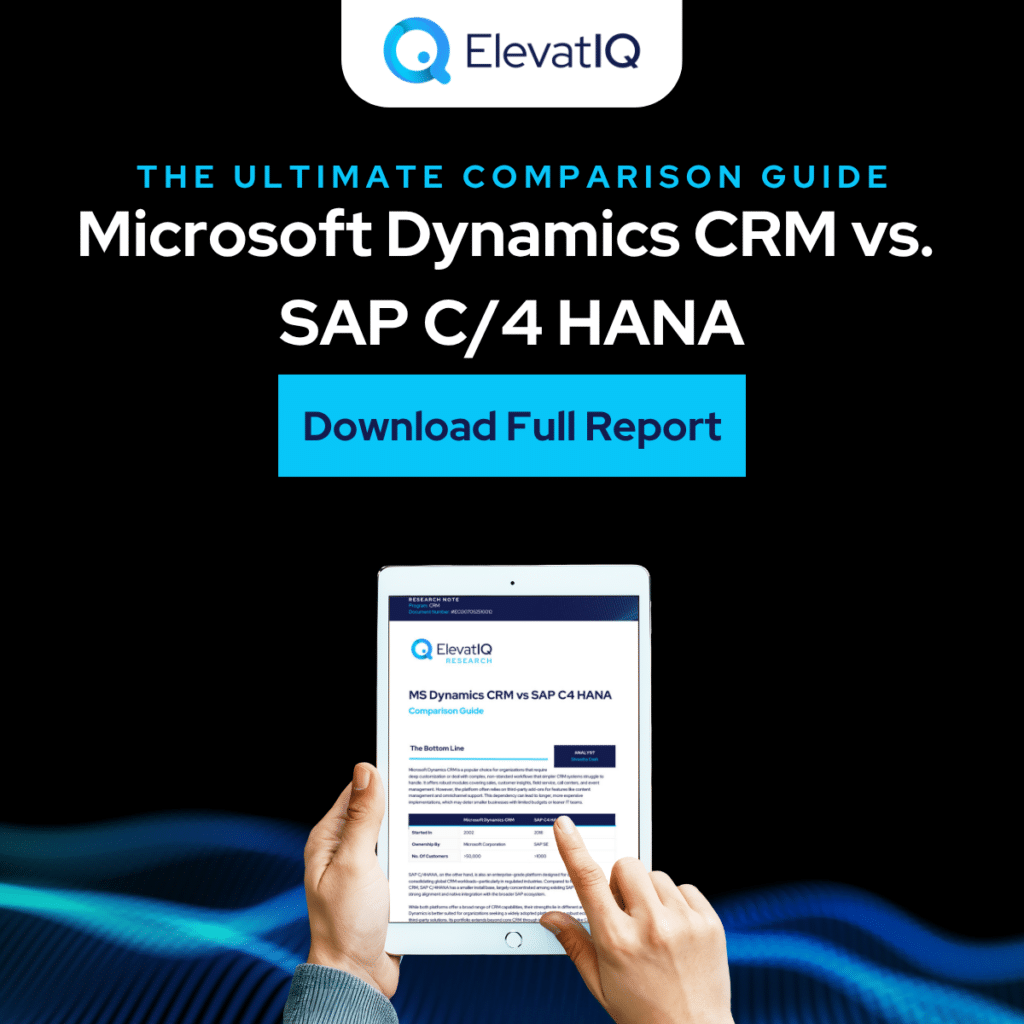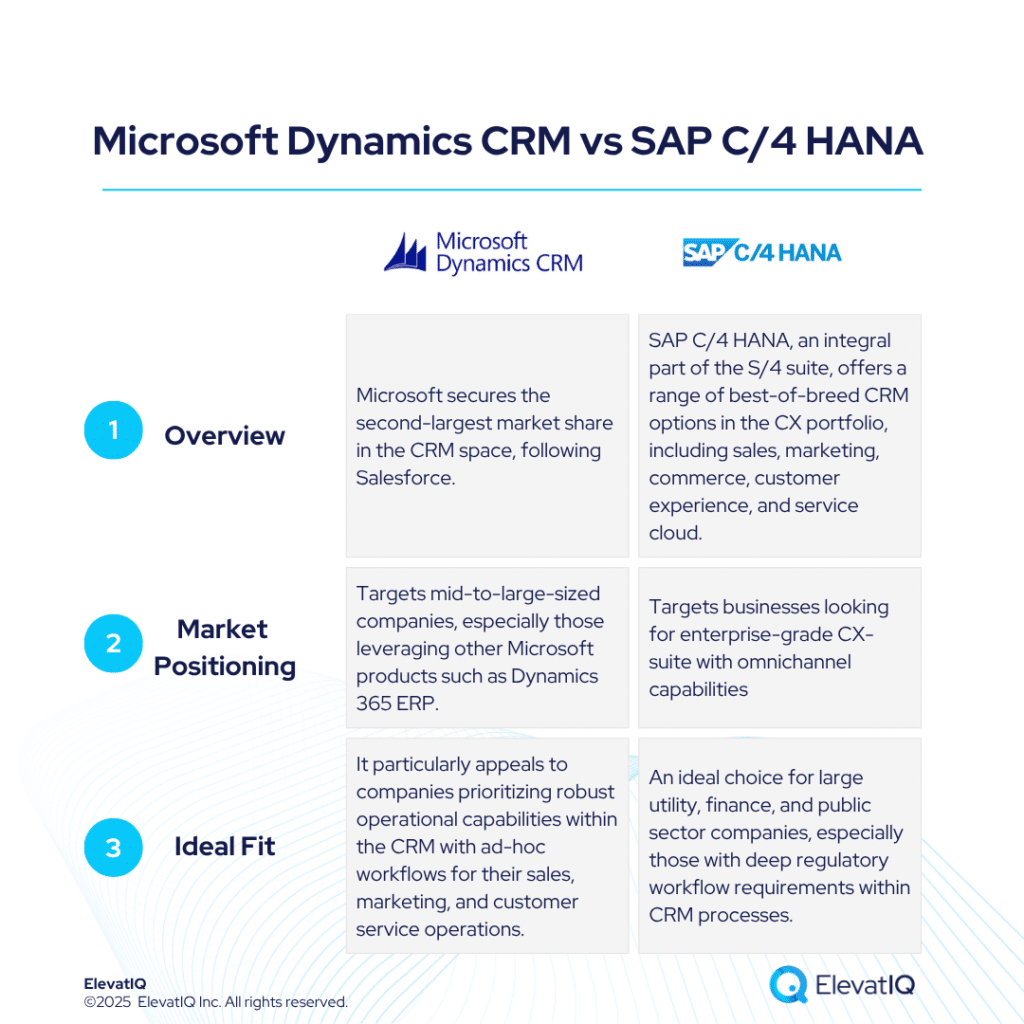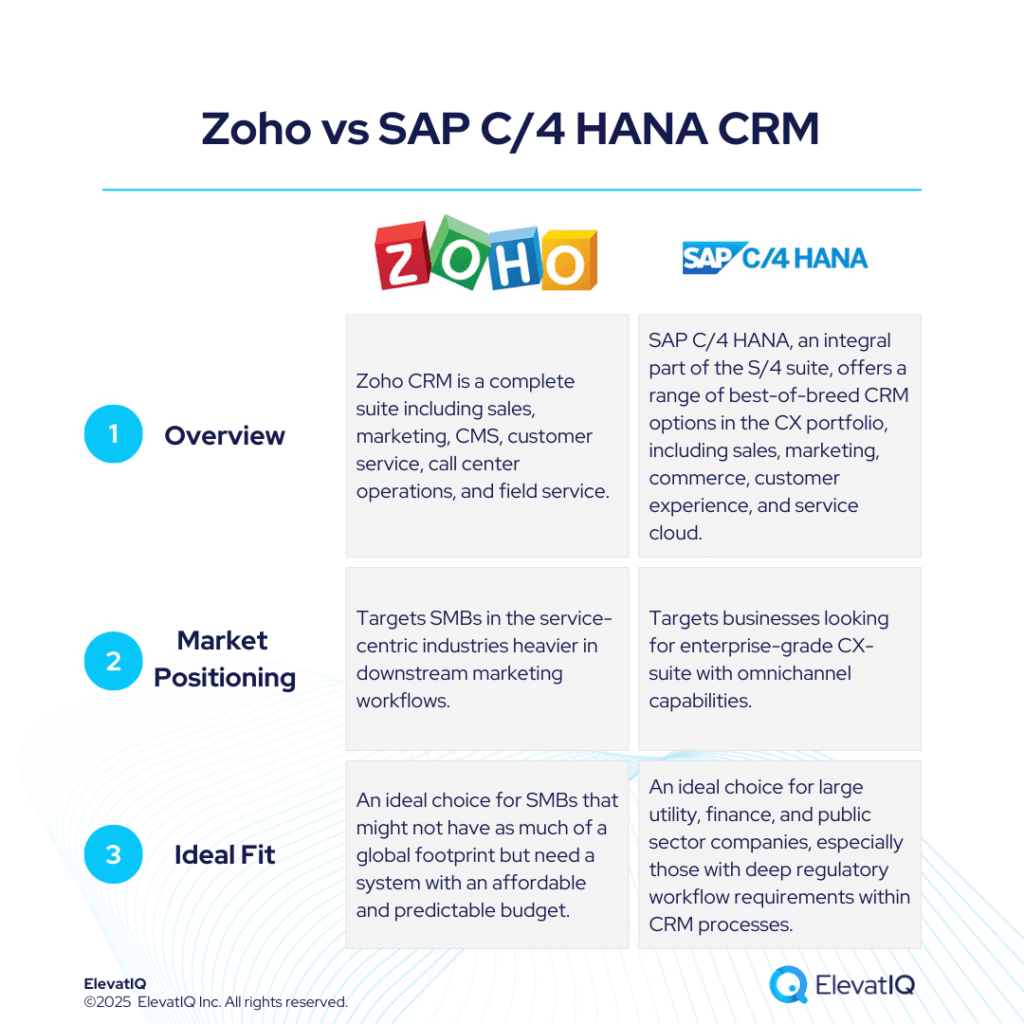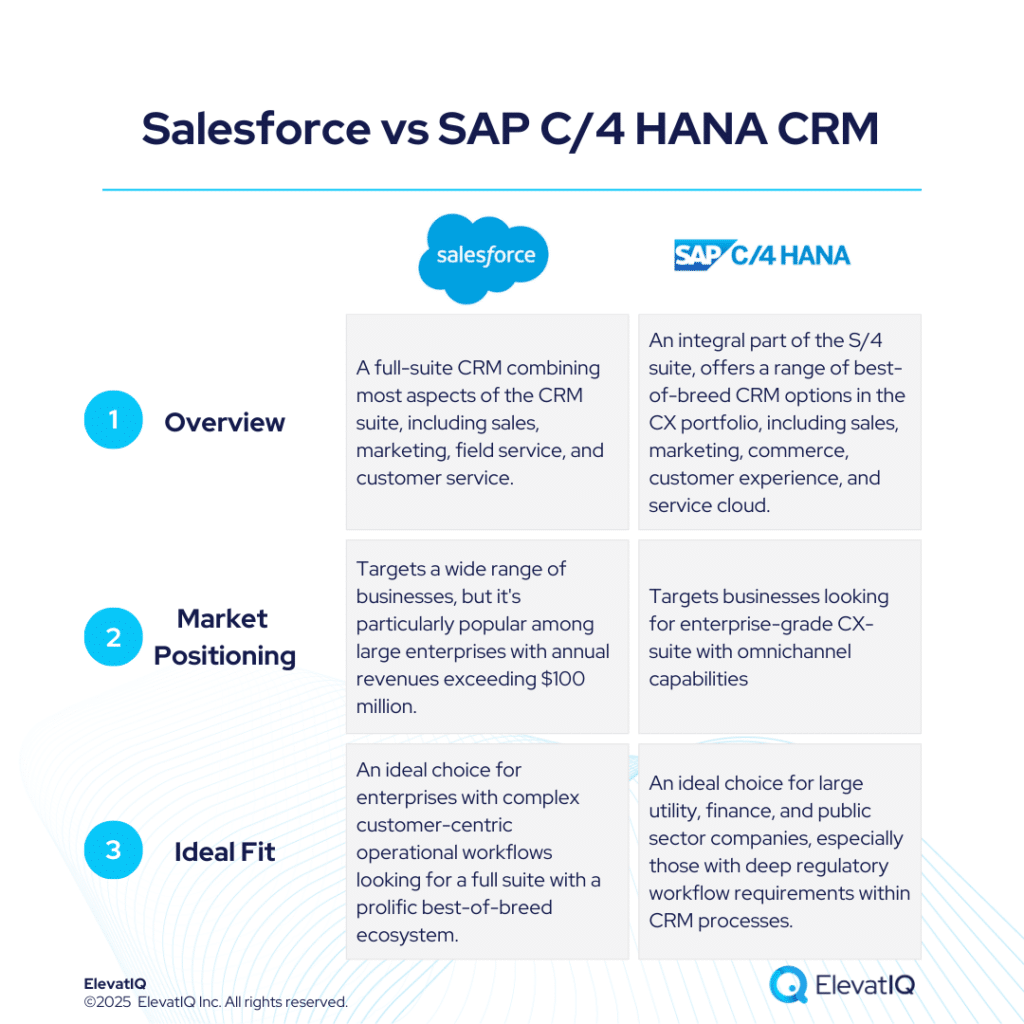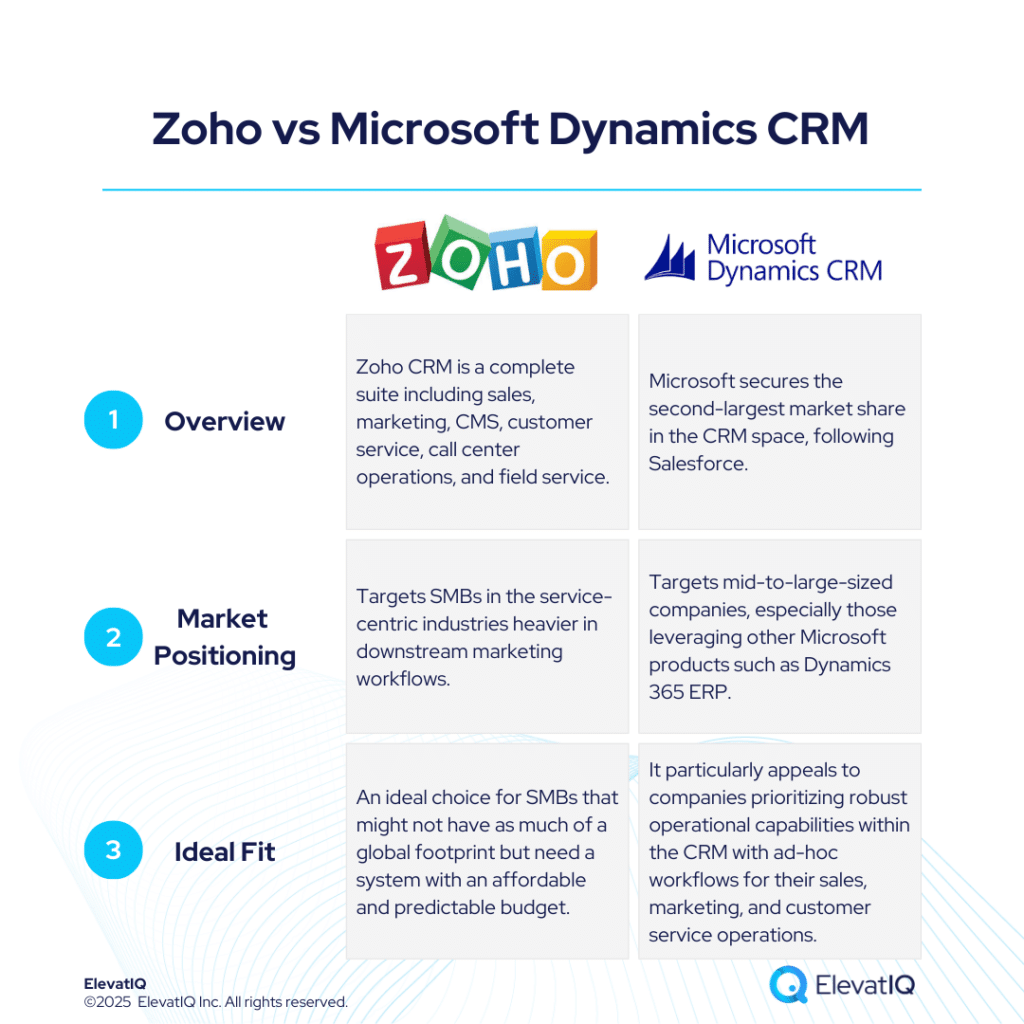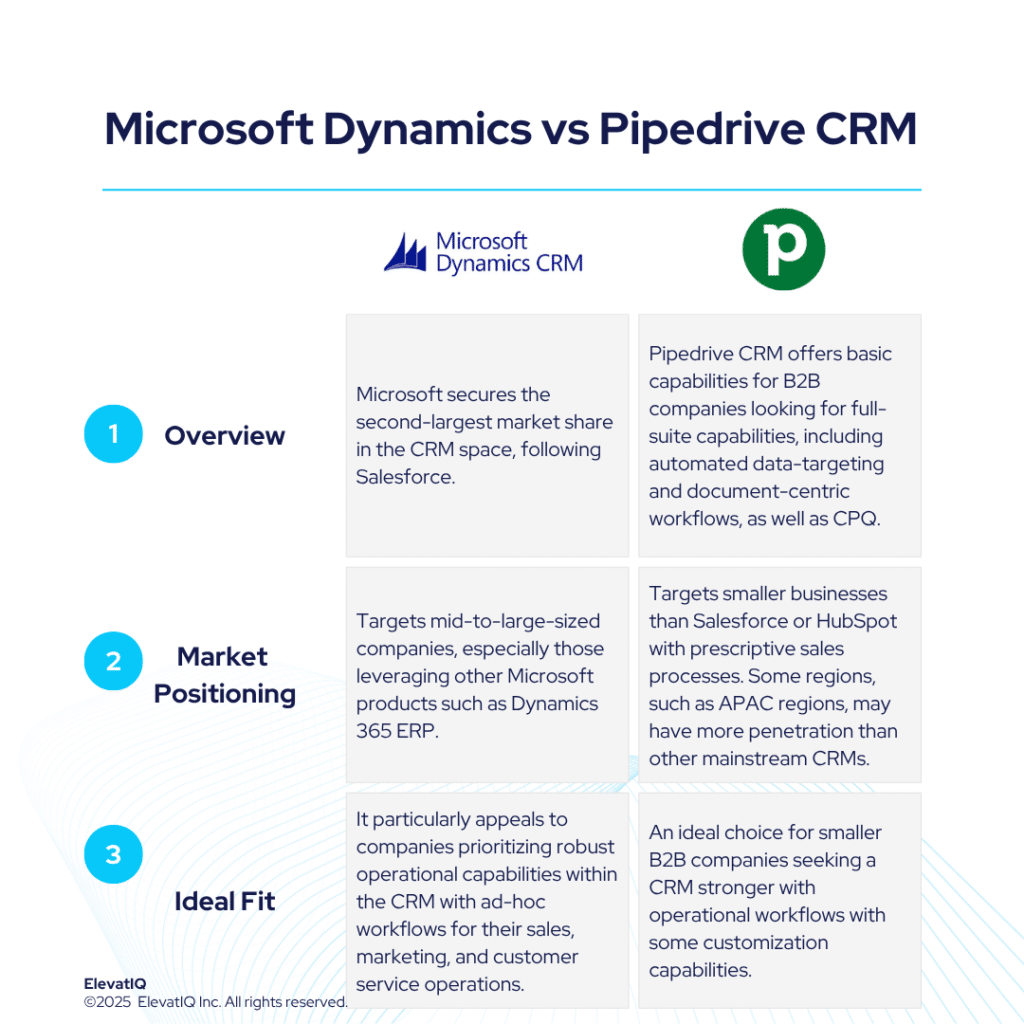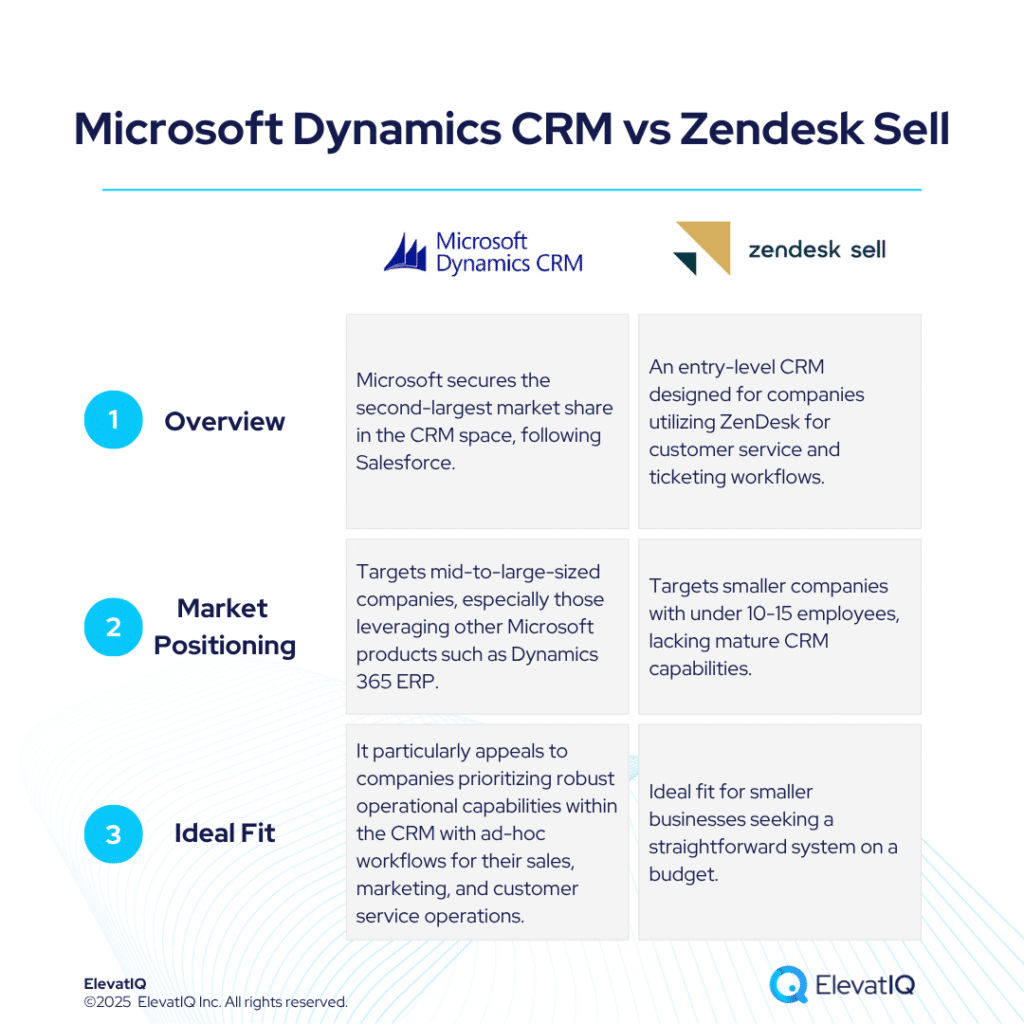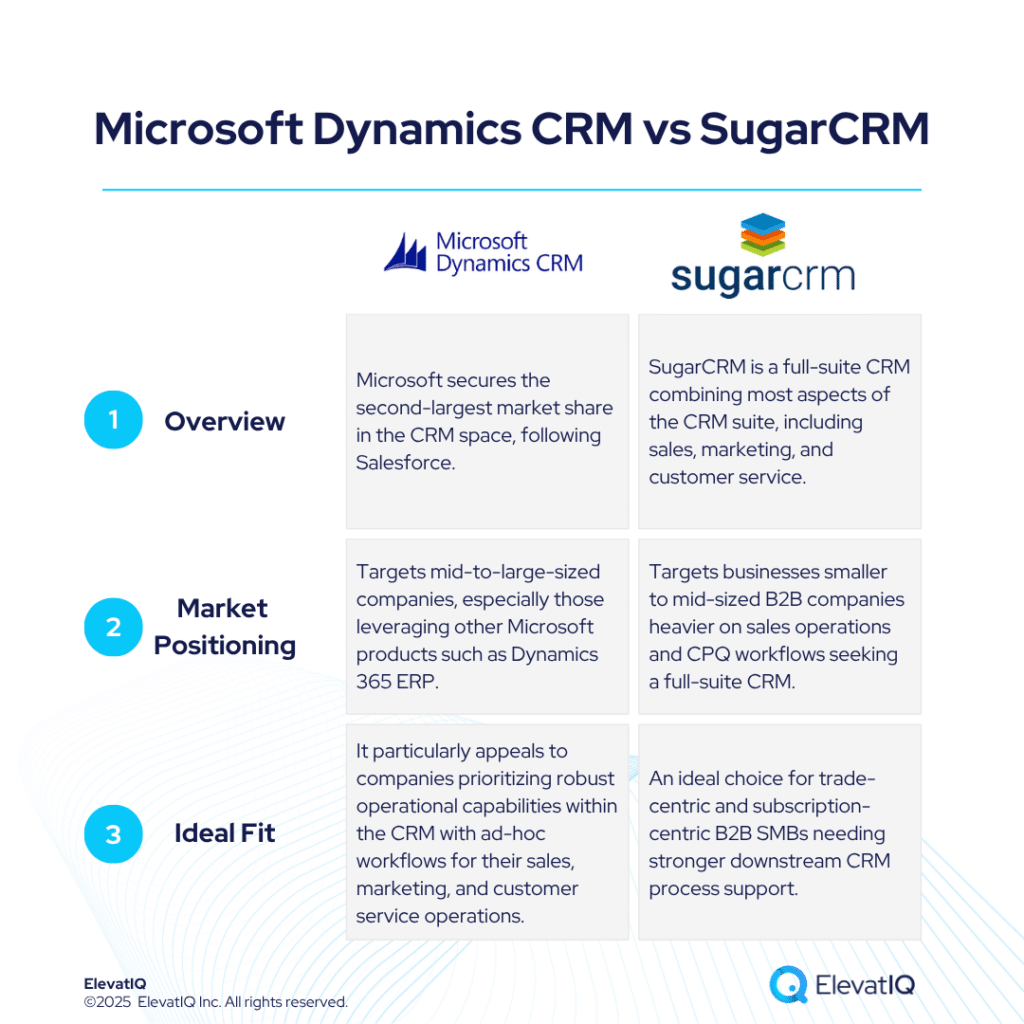Last Updated on July 10, 2025 by Sam Gupta
Microsoft Dynamics CRM suits organizations with complex, non-standard workflows that require high degrees of customization. Its extensive suite of modules—including sales, customer insights, field service, call center support, and event management—offers flexibility that many simpler CRMs cannot match. However, Microsoft’s reliance on third-party add-ons for key capabilities such as content management and omnichannel communication can extend implementation timelines and inflate costs. This makes it a less ideal option for smaller businesses or lean IT teams seeking a turnkey solution.
In contrast, SAP C/4 HANA is purpose-built for enterprises—especially those already invested in the SAP ecosystem—looking to unify global CRM operations. While popular in the SAP install base, its relatively smaller customer base of just over a thousand reflects both its niche focus and tight coupling with SAP’s broader ERP and compliance frameworks. It shines in industries where GDPR compliance and regulatory alignment are non-negotiable. SAP’s acquisition of tools equivalent to Microsoft’s Customer Insights allows it to provide robust customer data and marketing capabilities, although its operational depth in areas like event management still lags behind Microsoft Dynamics.
Ultimately, the choice between Microsoft Dynamics CRM and SAP C/4 HANA hinges on an organization’s specific needs and existing infrastructure. Microsoft Dynamics is favored by those looking for market maturity, extensive partner ecosystems, and broader CRM functionalities. SAP C/4 HANA, while less flexible in some areas, appeals to companies with stringent compliance requirements and existing SAP investments. That said, SAP’s reliance on legacy components and the scarcity of skilled consultants can increase total cost of ownership—making vendor lock-in and long-term scalability important considerations for prospective buyers.

What Is Microsoft Dynamics CRM?
Microsoft Dynamics 365 CRM offers a powerful, all-in-one solution designed to integrate tightly with Microsoft’s mid-market and enterprise ERP systems. Unlike more modular platforms, Dynamics 365 bundles its CRM capabilities—core CRM, Customer Insights, and field and customer service tools—into a single, cohesive ecosystem. This deep integration with product and pricing data enhances data integrity and cross-functional consistency but can also introduce complexity, especially for sales teams managing dynamic pricing or intricate quoting processes. While this complexity delivers long-term value for organizations that can harness it, it often calls for more upfront effort, customization, and consulting support compared to more plug-and-play CRMs like Salesforce or HubSpot.
What truly differentiates Dynamics 365 is its embedded support for customer data platform features and advanced marketing automation—especially around event management. From handling RSVPs to post-event follow-ups, the platform enables full lifecycle tracking without leaning on external tools, unlike many competitors. This integrated approach is especially valuable for enterprises looking to eliminate fragmentation across systems. But is it the right fit for your business model and team structure? Will your users benefit from the tight coupling of CRM and ERP data, or will it slow them down? How much complexity can your sales and marketing teams realistically manage? Download the Ultimate Microsoft Dynamics CRM vs SAP C/4 HANA Comparison Guide now to get side-by-side insights.
What Is SAP C/4 HANA CRM?
SAP C/4HANA isn’t as broad or flexible as Microsoft Dynamics CRM. But it fits well for enterprises already deep in the SAP ecosystem. It offers built-in integration with SAP S/4HANA, strong governance, and solid compliance features—ideal for regulated industries. Still, its complexity can hurt. Customization often needs heavy consulting. Its marketing tools aren’t very intuitive, so teams often turn to HubSpot or Marketo. That outside reliance weakens the unified CRM experience many organizations want.
Despite strengths in areas like privacy management and CPQ for product-driven businesses, SAP C/4 HANA’s limited mobile readiness, narrower ecosystem, and weaker support for sales and marketing extensions pose challenges. The platform’s rigid object model often requires upfront technical evaluation to ensure business alignment—a step that can add cost and delay decision-making. Can your team support the depth of customization needed to make SAP C/4 HANA work for your specific use case? Are your marketing and sales processes flexible enough to fit within SAP’s stricter framework, or will it require workarounds and third-party tools? Download the Ultimate Microsoft Dynamics CRM vs SAP C/4 HANA Comparison Guide now.
Microsoft Dynamics CRM vs SAP C/4 HANA Comparison
Microsoft Dynamics CRM shines with its unified data model, seamless integration with other Microsoft tools, and strong operational capabilities, especially around territory planning and compensation management. Its AI-powered insights and customizable workflows make it a compelling option for businesses that need both flexibility and scalability. Meanwhile, SAP C/4 HANA offers a deeply detailed data model suited for enterprise use cases, particularly in product-centric industries where 3D configurator-driven CPQ processes are essential. Its alignment with the SAP ecosystem ensures tight back-end integration, but it may fall short in areas like marketing automation and third-party ecosystem support.
Ultimately, the decision rests on your business’s core priorities. Do you need robust native marketing automation, or will you be supplementing with MarTech tools like HubSpot or Marketo? How critical is cost predictability in your licensing model? Are your teams equipped to manage the complexity of SAP C/4 HANA’s data model, or would a more user-friendly and cost-effective solution like Dynamics CRM deliver faster ROI? Download the Ultimate Microsoft Dynamics CRM vs SAP C/4 HANA Comparison Guide now to get an in-depth, side-by-side analysis.
Microsoft Dynamics CRM vs SAP C/4 HANA Module Comparison
Both platforms come equipped with a wide range of features aimed at streamlining operations and boosting organizational efficiency. This comparison highlights the unique strengths of Microsoft Dynamics CRM and SAP C/4 HANA across several key areas, offering valuable insights to help businesses make well-informed CRM decisions. Specifically, this section explores capabilities within core modules such as marketing, sales, customer service, and e-commerce.
Marketing
When it comes to marketing capabilities, Microsoft Dynamics CRM delivers a more comprehensive set of native tools compared to SAP C/4 HANA. Dynamics CRM supports content creation with reusable blocks, built-in SEO metadata management, centralized social media account handling, and a robust email marketing engine—all within a single interface. These features empower marketing teams to execute and manage campaigns more efficiently without the need for additional third-party solutions. In contrast, SAP C/4 HANA relies heavily on its SAP Marketing Cloud component to support email marketing, while other capabilities like content creation, SEO, and social media management are either absent or require integration with external tools.
This difference raises important questions for businesses evaluating CRM platforms through a marketing lens. Does your team need out-of-the-box capabilities to accelerate time to value, or are you equipped to manage and integrate multiple tools to fill functionality gaps? How important is native SEO and content reuse in your digital strategy? Would managing all marketing operations from a single dashboard make a measurable impact on campaign performance? Download the Ultimate Microsoft Dynamics CRM vs SAP C/4 HANA Comparison Guide now to dive deeper into these differences.
Sales
When evaluating sales capabilities, Microsoft Dynamics CRM provides a more out-of-the-box experience compared to SAP C/4 HANA. Dynamics CRM includes robust lead management—allowing teams to capture, score, nurture, and convert leads into opportunities—alongside visual sales pipeline tracking, integrated email tracking, meeting scheduling, and collaboration tools built directly into the platform. This native functionality gives sales teams a streamlined, user-friendly experience with minimal setup. In contrast, SAP C/4 HANA offers many of these features indirectly or through integrations with other SAP modules, which can require more configuration, consulting support, and time to deploy effectively.
For sales teams seeking quick access to core features without needing to piece together multiple systems, this difference could be a critical factor. Does your team need native lead scoring and pipeline visualization on day one, or can you invest in configuring complex integrations over time? Are collaboration and meeting scheduling tools important for your sales operations, or are they managed externally? How much weight do you place on seamless functionality versus modular customization? Download the Ultimate Microsoft Dynamics CRM vs SAP C/4 HANA Comparison Guide now to explore these questions in detail.
Customer Service
When it comes to customer service capabilities, both Microsoft Dynamics CRM and SAP C/4 HANA offer strong support features—but with subtle differences in approach and integration. Microsoft Dynamics CRM includes a robust, built-in ticketing system, live chat support through Dynamics 365 Customer Service, and automation tools for streamlining customer support, such as escalation rules and response templates. It also provides an intuitive self-service portal and tools for managing omnichannel engagements, allowing businesses to deliver consistent, real-time support across multiple platforms—all natively within the Dynamics environment.
SAP C/4 HANA, via its Service Cloud, also delivers powerful service capabilities including ticketing, live chat, customer support automation, and omnichannel support. However, these features often rely on separate SAP modules, which may require more integration and configuration effort. So, which platform aligns better with your existing support workflows? Is a unified, out-of-the-box experience more important than flexibility through modular SAP components? Can your support team manage integrations efficiently, or would they benefit from a single interface with built-in automation? Download the Ultimate Microsoft Dynamics CRM vs SAP C/4 HANA Comparison Guide now to compare these platforms head-to-head.
E-commerce
Microsoft Dynamics CRM and SAP C/4 HANA both provide solid capabilities for managing product catalogs and streamlining order fulfillment, though they approach these tasks differently within their ecosystems. Microsoft Dynamics CRM enables businesses to create and manage comprehensive product catalogs and integrates seamlessly with Dynamics 365 Supply Chain Management to automate and optimize order fulfillment processes. Additionally, it offers advanced customer segmentation and personalized recommendations, empowering businesses to deliver targeted marketing and tailored shopping experiences based on deep customer insights. SAP C/4 HANA, on the other hand, leverages components like SAP Commerce Cloud and SAP Marketing Cloud to handle product catalog management and order processing, supported by analytics and customer data platforms that enable highly personalized shopping journeys.
As you evaluate these platforms, consider how critical seamless integration with supply chain and marketing tools is to your operations. Do you need native, out-of-the-box integrations for product catalog and order management, or are you comfortable coordinating across multiple SAP modules? How important is the ability to deliver personalized shopping experiences based on real-time customer data? Would your business benefit more from a tightly integrated Microsoft ecosystem or SAP’s specialized commerce and marketing components? Download the Ultimate Microsoft Dynamics CRM vs SAP C/4 HANA Comparison Guide now to explore these questions in depth.
Microsoft Dynamics CRM vs SAP C/4 HANA Pros
Microsoft Dynamics CRM is designed to support complex business objects, making it a strong fit for larger, regulated enterprises that require robust compliance workflows. It offers audit-ready consent and preference management capabilities to help organizations meet stringent regulations such as GDPR, CCPA, and LGPD. With database-level replication and a shared common data model, Dynamics CRM ensures data consistency and cross-channel personalization. Its seamless integration with other Microsoft products further enhances operational efficiency and provides a unified experience across the business.
SAP C/4 HANA, on the other hand, is known for its tight integration with the broader SAP ecosystem, which is a significant advantage for organizations already invested in SAP’s suite of enterprise solutions. It comes pre-packaged with advanced territory management and global sales compensation planning capabilities, along with enterprise-grade CPQ and sales performance management tools. As you consider these platforms, ask yourself: How critical is native integration with other enterprise systems? Does your organization require specialized territory and compensation planning features out of the box? How important is compliance and consent management in your CRM strategy? Download the Ultimate Microsoft Dynamics CRM vs SAP C/4 HANA Comparison Guide now to dive deeper into these considerations.

Microsoft Dynamics CRM vs SAP C/4 HANA Cons
Microsoft Dynamics CRM is known for its tightly linked data objects, which can create challenges for sales and marketing teams seeking a more fluid, user-friendly experience. While it offers powerful capabilities, the platform’s complexity and restrictive data model may hinder teams focused on sales rather than operational details. Additionally, Microsoft Dynamics CRM lacks sophistication in pre-sales processes like marketing automation and can be cumbersome when importing or exporting CSV files. These factors can lead to usability challenges, particularly for small to mid-size organizations that need straightforward, easy-to-use CRM solutions.
Given these considerations, it’s important to ask: How much customization and consulting support is your team prepared to invest to tailor the CRM to your needs? Would a complex but powerful system like Dynamics deliver long-term value despite initial usability hurdles? Or do you need a more intuitive platform that simplifies everyday sales and marketing tasks? How critical is ease of data import/export and marketing automation in your decision-making process? Download the Ultimate Microsoft Dynamics CRM vs SAP C/4 HANA Comparison Guide now to explore these questions further.
Download the Full Research Report
